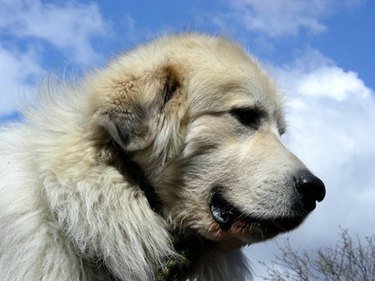
Large dogs with deep chest cavities, such as Great Danes, Akitas and St. Bernards, are prone to bloat. Bloat, sometimes known as torsion or gastric dilatation-volvulus (GDV), is a fatal emergency if not treated immediately. Surgery is sometimes used to correct the twisted stomach in your dog, but after the surgery is complete you must take extra steps in caring for your dog. Knowing how to care for a dog after bloat surgery takes time and patience, but isn't difficult for an average dog owner.
Step 1
Take your dog to every follow-up appointment that your vet schedules after surgery. Reason being, this is when the scar tissue is at its most tender state, both internally and externally. During the first 48 to 72 hours after surgery, your dog's catheter and tube can dislodge. Other complications can arise as well, such as gastric necrosis. These complications occur early on and the dog requires close monitoring by a vet.
Video of the Day
Step 2
Refuse your dog meals and water for the first 48 to 72 hours post-surgery. This is so the dog has time to acclimate to the surgery after-the-fact. Your dog is sensitive during this time and feeding it too soon can inflame its scar tissues and tender stomach.
Step 3
Start your dog on a regimen of small meals. Small feedings throughout the day slowly acclimates your dog to eating after the surgery.
Step 4
Administer your dog's medication as directed by the veterinarian. Do not skip medications or take the dosage into your own hands. Exactly follow your vet's instructions to help your dog heal and recover from its condition and the treatment.
Step 5
Balance your dog's diet after it has healed to a regimen of three meals a day. Bland foods are recommended for dogs who have received treatment for torsion. The bland foods are easily digested by the dog's sensitive stomach. Avoid foods that are rough on your dog's stomach such as low quality foods that use a lot of filler materials.
Tip
Gradually change your dog's food if you are switching types or brands. Immediate change of foods can irritate any dog's stomach, especially a dog who is recovering from bloat and bloat treatment.
Avoid foods that give your dog gas. Gassy foods contain peas, beets, onions and soy beans in high amounts.
Refrain from exercising your dog for up to two hours before and after its meals. This gives the food and stomach time to settle.
Video of the Day